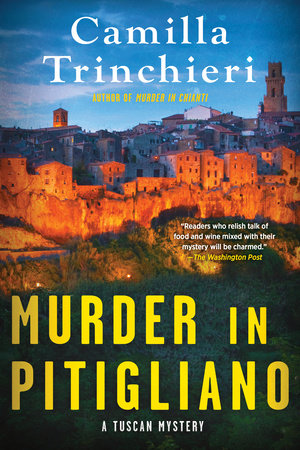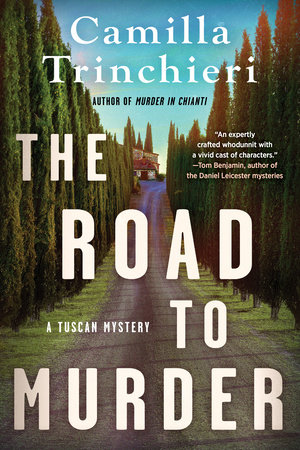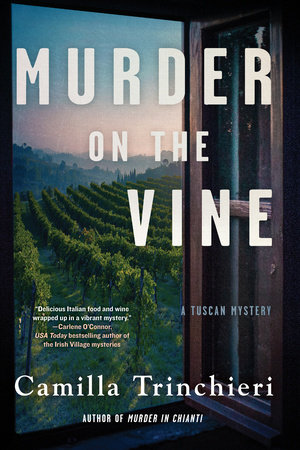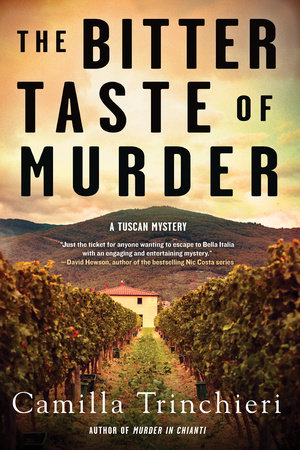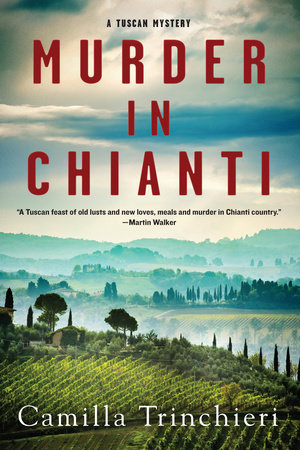Excerpt
Murder in Pitigliano
Bar All’Angolo was busier than usual.
Outside the cold morning was darkening. The light rain was ready to turn into the forecast all-day downpour. Workers quickly downed Jimmy’s espressos to give them an extra boost for the long day ahead. Grade school students knocked against each other’s loaded backpacks and umbrellas while reaching for the ciambellas and cornetti Sandro, the co-owner of the café, handed out when he wasn’t behind the cash register. Parents urged them to hurry. The high school students had already gone to take the bus for Greve. Nico and Gogol were having their usual breakfast by the French window. Nelli had already left for the Querciabella vineyard. With so many feet shuffling across the café floor, OneWag had chosen to lie down under Nico’s chair.
“Want some?” a small voice asked from behind Nico. Nico turned around to see a little girl kneeling on the floor offering OneWag a piece of her chocolate-filled cornetto.
“Please don’t give him that,” Nico said gently. “Chocolate is very bad for dogs.”
“I know that.” With her face hidden by a mass of red curls, the girl quickly put the piece in her mouth. OneWag sniffed her hand.
“Cilia, get off the floor!” ordered a woman, slamming her coffee cup down on the near counter. Dressed in jeans and a green down coat, she had the same red curls down to her shoulders. “Floors are dirty, dogs are dirty and they bite. Why don’t you ever listen to me?”
“Do not let your fear defeat her,” Gogol announced.
“My dog doesn’t bite,” Nico added, wondering why any mother would ever place fear in a child’s heart. He had heard Italian women tell their children, “If you’re not good, the boogeyman will get you.” It made him angry.
Cilia gave OneWag an awkward hug and quickly stood up to face her mother, who was marching over on heeled boots. “He looked hungry, Mamma.”
Cilia’s mother, a tired-looking woman somewhere in her late thirties, grabbed Cilia’s hand and addressed Nico and his Dante-quoting friend. “You’ll have to excuse me. Nice and mean dogs all look the same to me. That goes for men too. Come, Cilia.” She pulled her daughter’s arm. “You’ll be late for school.”
The little girl tugged her hand away and ran out of the café. Her mother shook her head in exasperation and followed her out.
“I’ve never seen them before, have you?” Nico asked the old man now chewing on the salame crostino meant for Nico.
“The little girl grieves with purpose; the mother grieves with anger,” Gogol mumbled. “My words.”
I like your words best, Nico wanted to say, but for fear of insulting Gogol’s idol, he bit into his second whole wheat cornetto instead. It was still warm. “Why do you say they’re grieving?”
“Can you not feel it?”
“It was clear the mother was not in a good mood. The child seemed all right.”
“Rocco holds the truth,” Gogol said.
“What?”
“The little one slipped something under his collar.”
“She did?”
Gogol answered with a slow blink.
Nico looked down. “Come out, buddy.” OneWag had slid between Nico’s feet to nudge Gogol’s leg for a treat.
“Let me see.” Nico slapped his thigh lightly to call the dog just as the old man lowered his arm, his fingers dangling a bare crostino. OneWag gently took the bread and lay down to eat.
A cold sweep of wet air made Nico look up.
“Maremma maiala!” Gustavo swore as he quickly closed the café door.
As the dog chewed, a small roll of paper dropped to the floor.
“Buongiorno, Gustavo,” Sandro said from behind the cash register.
Gustavo took off his fedora and shook it free of water, revealing a full head of white hair. He wore a heavy gray coat with the countless scarves his wife knit for him. He saw Nico and raised his hand. “Buon di’, amico.”
“Buongiorno,” Nico answered. Gustavo was one of the four pensioners Perillo liked to call the Bench Boys. He was somewhere in his eighties and often grumpy.
“A cappuccino and a ciambella,” Gustavo called out to Jimmy at the far end of the room as he made his way to Nico’s table. He loosened his scarves. “No sitting on benches today.” The friends spent their days sitting in the main piazza just outside the café.
“‘The dense air to water changed,’” Gogol quoted.
“Well said.” Gustavo pulled out a chair and sat down with a thump.
“Do you know a little girl named Cilia?” Nico asked. Gustavo was the town historian of past, present and future.
“Ah, la piccola found you. I’m glad.”
“She found my dog.” Nico slapped his knee again. “Come here, OneWag.”
Now licking a paw, the dog paid no attention. Gogol leaned down with a loud sigh, picked up the small rolled-up piece of paper lying next to OneWag and held it up.
Gustavo took it from him. “I see writing was easier for her. What does it say? She seemed most anxious to find you. You must read it.”
“If you give it to me, I will.”
“Ah, forgive.” Gustavo reluctantly dropped the note in Nico’s hand. He quickly unrolled it.
Elp mio babbo pleese.
He not doNico put the note in his shirt pocket.
Gustavo stretched out his neck over the table. “What does it say? Why does she want a detective?”
Nico gave Gustavo an apologetic grin. “Maybe it’s the dog she is interested in. Don’t you think?”
“Ah, that’s a good one. I don’t think.”
“How would she know I was once a detective?”
“Not once. Still a detective. Everyone knows who you are. And if anyone has a question, they ask Gustavo.”
“She’s not from here, is she?”
“No. My wife spotted her mother—you can’t miss the fiery hair—at our Coop. She’s the new cashier. The salumeria was my wife’s next stop, and according to Enrico . . . Have you had one of his olive loaves?” Gustavo closed his eyes. “Manna from Heaven.”
“I agree. According to Enrico what?”
“Signora Livia and la piccola moved into the apartment next door nine days ago. Yesterday—”
“‘Yesterday,’” Gogol interrupted, earning a frown from Gustavo, “‘upon all sides, the sun shot forth the day.’”
“So it did,” Gustavo conceded through tight teeth as the rain lashed against the French windows in front of their table. “Yesterday la piccola walked up to my bench and introduced herself. ‘
My name is Cecilia but everyone calls me Cilia. Who are you?’ After I gave her my name and asked her where she was from—” Gustavo turned away suddenly to glare at Sandro, who was facing a line of customers waiting to pay. “Time is not on my side anymore, young man. When will you bring me my cappuccino and ciambella? I’ll be eighty-nine next week.”
Nico stood up and walked to the far counter.
“Gustavo, you were eighty-nine last week,” Sandro said, grinning as he took money and gave out change. “It didn’t work then either. You can see that Jimmy and I are busy. You’ll have to come get your own breakfast. Besides, you’re only eighty-four.”
Nico picked up the tray Jimmy had prepared, walked it back to the table and sat down.
“Now here’s a true friend,” Gustavo loudly declared after taking a long drink of cappuccino. He now had foam whiskers.
“Where is she from?” Nico asked.
“Instead of answering me, she asked if it was true that you were a detective from America. When I said it was, she wanted to know how to find you. I told her to look for a big man with a cowboy walk and fluffy dog called Rocco. I also told her when she would find you here.” Gustavo bit off a large piece of ciambella, showering the floor with sugar. OneWag started licking.
Cowboy walk? Nico picked up cornetto crumbs on his plate with his index finger. He’d never even met a horse. He’d ask Nelli. “You didn’t ask her why?”
“I did. Her answer: ‘
I will tell Nico.’ She also wouldn’t give me her last name. Something is off-kilter with mother and daughter. That’s what my nose says.” Gustavo had one prominent enough to make any Roman statue proud.
“‘There is no greater pain than remembering a happy time when in misery,’” Gogol quoted.
“True enough,” Gustavo admitted. “I am, however, not in misery. Only annoyed I do not know anything about them, not even their last name. La piccola chose me to ask her question, which makes it hard to leave her be.” He stood up and wrapped the blue scarf around his neck. “My first love had hair as red as Cilia’s and her mother’s.” He wound the green scarf over the blue one. “That could explain everything. Don’t tell my wife. Arrivederci, I go and pay.”
“Breakfast is on me,” Nico said, standing up.
“For la piccola?”
“For her and your first love.”
“Ah! I was only twelve, but it was a great one. I am in your debt. I hope I have not brought you trouble. We have had a peaceful fall. See you again when the sun shines forth.” Gustavo shrugged on his coat, donned his wet hat and strode out into the rain.
“It is the child who is in misery,” Gogol said after the door closed on Gustavo’s back.
“I hope not. She’s too young for misery.”
“It can come at birth.”
Nico stood and picked up his umbrella. Born not knowing who his father was, mercilessly bullied growing up, losing his mother at fourteen, Gogol had had his share of misery. He had buried his head in Dante’s
La Divina Commedia, Italy’s equivalent of Shakespeare in the English world. Gogol remembered every word and would quote the Florentine poet every chance he got. Dante’s travels through Hell, then Purgatory were perhaps a voyage Gogol was familiar with; Heaven the ultimate goal for a man who never missed a Sunday Mass. “It’s time to start my day. Ciao, Gogol. See you tomorrow.”
“If I live.”
“Make sure you do.” He waved to Sandro and Jimmy. “A domani.”
Sandro nodded. Jimmy gave him a thumbs up. There was no need to pay. Sensible Nelli had convinced him to open an account. Now he paid monthly. “Come on, buddy.”
OneWag crouched between Gogol’s legs, head between his paws. He hated getting wet.
Nico shook his head. “To think you used to live on the streets.” He bent down and picked the dog up. Tucking OneWag under his arm, Nico walked to the door, managed to open his umbrella without dropping the dog and walked out.
A gust of rain slapped his face. “Maremma maiala!” Nico exclaimed. Whatever that meant, it sounded right. OneWag tucked his snout in Nico’s jacket. Nico splashed toward Luciana’s flower shop two doors down. The metal shutter was still down. Nico tightened his hold on the dog and ran across the piazza to his Fiat 500.
In the car he managed to take off his sneakers and socks despite the tight space. OneWag’s towel dried his feet. A dry OneWag watched him from the backseat with what Nico interpreted as a snickering look. “I deserve that, buddy.” One sneaker had a nice long split on the sole. The other, two small ones. He’d known they were there but had been too lazy to drive to Greve to buy new ones. Buying online wasn’t an option with his feet.
Nico sat back and reread the note Cilia had left him:
Elp mio babbo pleese. He not doShe’d been too shy to ask for help or give him the note directly. Or was she afraid her mother would spot her talking to him? Something had stopped her from finishing what she had planned to write. Her mother was working the cash register at the Coop right now. What would he say to her?
Hi, your daughter asked me to help her father. Do you know why? He couldn’t. It could get Cilia in trouble. He also needed a last name.
He parked the car next to the Coop, picked up a grocery bag from the back seat and got out. OneWag tried to hide under the front seat.
“Relax. You’re not allowed in.” Nico shut the door. Thanks to the threat of more rain he didn’t have to worry OneWag would start tearing the seat cover. The dog had made it clear from the start of their friendship that being left behind was a punishable affront to his street dog freedom.
Livia was sitting at the cashier counter just left of the Coop entrance, wearing a spring green sweater, her red curls tied on top of her head with a rubber band. She was busy with a customer and did not see him. Nico picked up a basket and walked along the three aisles buying onions, eggs, porcini mushrooms, a box of Carnaroli rice, a six-pack of Panna water, chicken broth cubes, a couple of boxes of De Cecco spaghetti, butter from the Alps and several cans of anchovies. He hoped Livia wouldn’t add up his groceries with the speed of the cashier she’d replaced.
“Buongiorno, Signora.” Nico dropped the six-pack of water on the counter. He was going to take his time unloading. Luckily no one was behind him. “I hope Cilia got to school on time.”
She gave him a quick sullen glance. “Barely.”


